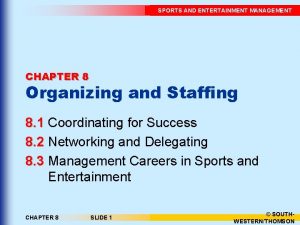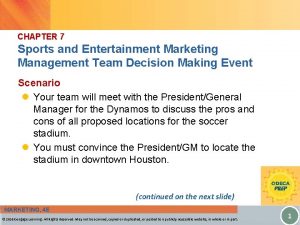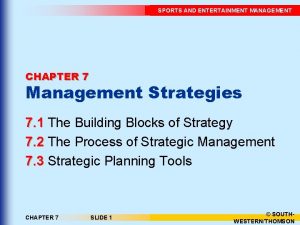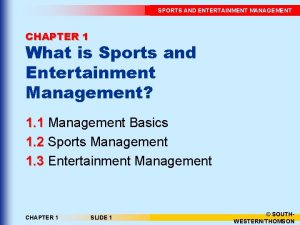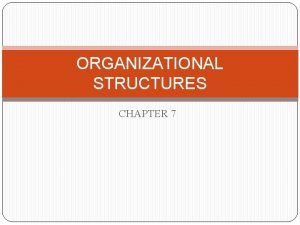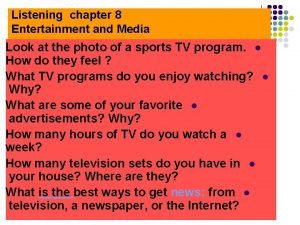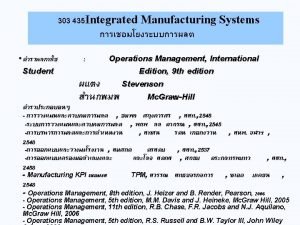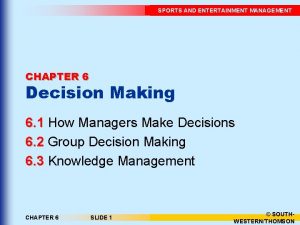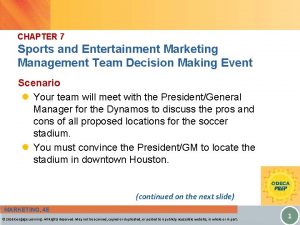SPORTS AND ENTERTAINMENT MANAGEMENT CHAPTER 8 Organizing and






























- Slides: 30

SPORTS AND ENTERTAINMENT MANAGEMENT CHAPTER 8 Organizing and Staffing 8. 1 Coordinating for Success 8. 2 Networking and Delegating 8. 3 Management Careers in Sports and Entertainment CHAPTER 8 SLIDE 1 © SOUTHWESTERN/THOMSON

LESSON 8. 1 SPORTS AND ENTERTAINMENT MANAGEMENT COORDINATING FOR SUCCESS GOALS n Define human resources management and identify human resources management activities. n Describe the procedure to recruit and hire the best personnel. n Explain why coordinating and giving feedback are important responsibilities of human resources management. CHAPTER 8 SLIDE 2 © SOUTHWESTERN/THOMSON

SPORTS AND ENTERTAINMENT MANAGEMENT MANAGING HUMAN RESOURCES EFFECTIVELY n Human resources management consists of all activities that are involved with hiring, developing, and paying the individuals responsible for doing the work. n Satisfied employees are more likely to contribute to a successful team effort. CHAPTER 8 SLIDE 3 © SOUTHWESTERN/THOMSON

SPORTS AND ENTERTAINMENT MANAGEMENT MANAGING HUMAN RESOURCES EFFECTIVELY n Human resources activities include: n Recruiting n Hiring n Training n What’s important to employees? n Financial security is a big issue n Benefits are equally important CHAPTER 8 SLIDE 4 © SOUTHWESTERN/THOMSON

SPORTS AND ENTERTAINMENT MANAGEMENT MANAGING HUMAN RESOURCES EFFECTIVELY n Fringe Benefits n Items in addition to pay that employees receive n Full-time employees are more likely than part-time employees to receive benefits. (Ex: health insurance, paid vacation) n Sports and Ent. Management positions often include the fringe benefit of attending events and socializing with celebrities. CHAPTER 8 SLIDE 5 © SOUTHWESTERN/THOMSON

SPORTS AND ENTERTAINMENT MANAGEMENT HIRING THE BEST PERSONNEL n Employment – all activities required to maintain an adequate number of qualified employees for the company. n Money and time n Job description – lists the basic tasks of the job. n Job specification – lists all qualifications a worker needs to successfully complete the job. CHAPTER 8 SLIDE 6 © SOUTHWESTERN/THOMSON

SPORTS AND ENTERTAINMENT MANAGEMENT HIRING THE BEST PERSONNEL n S & E industry is highly competitive. n Many individuals get their foot in the door by taking part in internships. n 60 -80 hours work weeks are common during busy season. n Productive and enthusiastic interns are often rewarded with full-time positions. CHAPTER 8 SLIDE 7 © SOUTHWESTERN/THOMSON

SPORTS AND ENTERTAINMENT MANAGEMENT HIRING THE BEST PERSONNEL n Recruiting applicants n Future employees are recruited through recommendations from current employees, employment agencies, and applications. n Resume – a summary of an applicant’s previous and current job experiences. n Cover letter – explains why the applicant is qualified for the position and requests an interview. CHAPTER 8 SLIDE 8 © SOUTHWESTERN/THOMSON

SPORTS AND ENTERTAINMENT MANAGEMENT IMPROVING EMPLOYEE PERFORMANCE n Orientation – initial training to make new workers feel comfortable with their jobs and organization. n Staff development – needed for new technology, new management, and productivity. Should be upbeat and well organized. n Flattened organizations with fewer managers are becoming popular. Businesses expect employees to work as a team. Teams expected to take more responsibility for work and make more decisions. CHAPTER 8 SLIDE 9 © SOUTHWESTERN/THOMSON

SPORTS AND ENTERTAINMENT MANAGEMENT IMPROVING EMPLOYEE PERFORMANCE n Match making n Coordinating – matching the best employees with the tasks that must be completed. n Employee relations – critical piece of human resources. n Labor unions – represent S&E industries and bargain with management for members’ wages, hours, and working conditions. CHAPTER 8 SLIDE 10 © SOUTHWESTERN/THOMSON

SPORTS AND ENTERTAINMENT MANAGEMENT IMPROVING EMPLOYEE PERFORMANCE n Performance – employee output evaluated in relation to company’s mission. n Performance problems may indicate a need for training. n 360 -degree feedback – evaluates an employee based upon info from a range of people who have contact with the employee (peers, customers, and suppliers). n Most employees appreciate this system, they believe the people they work with every day have a better understanding of their contributions. CHAPTER 8 SLIDE 11 © SOUTHWESTERN/THOMSON

LESSON 8. 2 SPORTS AND ENTERTAINMENT MANAGEMENT NETWORKING AND DELEGATING GOALS n Define delegation of duties. n Explain the latest trends in the sports and entertainment industries. n Describe the skills needed by employees in today’s workforce. CHAPTER 8 SLIDE 12 © SOUTHWESTERN/THOMSON

SPORTS AND ENTERTAINMENT MANAGEMENT CHANGING BUSINESS CULTURE n Shift from producing physical goods to producing services and information n Manufacturing has moved overseas to benefit from cheap labor n Two-income families are opting to spend their extra money on entertainment, dining out, and information technology. n Customers’ needs take priority CHAPTER 8 SLIDE 13 © SOUTHWESTERN/THOMSON

SPORTS AND ENTERTAINMENT MANAGEMENT PASS IT ON n Delegation is passing duties to another employee or team member with the expectation that the individual will fulfill the responsibility. n Trust becomes stronger with a flattened organization that has few layers of management. n When leaders delegate tasks, they understand the risk they are taking. Managers realize that even delegated tasks are ultimately their responsibility. CHAPTER 8 SLIDE 14 © SOUTHWESTERN/THOMSON

SPORTS AND ENTERTAINMENT MANAGEMENT THE LATEST TRENDS n Globalization n Many companies have foreign operating divisions. n The foreign divisions customize services and products to the local cultures. n International divisions have management teams that operate both separately from and cooperatively with corporate headquarters. n Advanced computer technologies n Allow workers to operate “virtual offices. ” n Online services, cell phones, and PDAs make info available 24 hrs a day. CHAPTER 8 SLIDE 15 © SOUTHWESTERN/THOMSON

SPORTS AND ENTERTAINMENT MANAGEMENT THE LATEST TRENDS n Diversity n Often refers to race and ethnicity, but also includes differences in lifestyles, age, nationality, physical abilities, religion, geographic background, position in an organization, and social and economic status. n Networking n Involves creating and maintaining relationships that are beneficial to all participating parties. CHAPTER 8 SLIDE 16 © SOUTHWESTERN/THOMSON

SPORTS AND ENTERTAINMENT MANAGEMENT WHAT SKILLS DO EMPLOYEES NEED? n Self direction (work on their own) n Effective communication skills (laterally, upward, and downward) n Communication must be clear, accurate and wellorganized. n Written communication must have correct grammar, spelling, and punctuation to make a positive impression. n Nonverbal communication skills also are important. Managers must be able to respond to body language and nonverbal cues. CHAPTER 8 SLIDE 17 © SOUTHWESTERN/THOMSON

SPORTS AND ENTERTAINMENT MANAGEMENT WHAT SKILLS DO EMPLOYEES NEED? n Decision-making skills – more evenly distributed power in flattened organization requires workers to make more decisions. n Critical thinking goes beyond completing an assigned task. CHAPTER 8 SLIDE 18 © SOUTHWESTERN/THOMSON

SPORTS AND ENTERTAINMENT MANAGEMENT TEAMWORK IS KEY n Flattened organization – very common for employees to work as a team to create goals. n Focal point teams – work on each goal to accomplish the mission and strategic objectives of the organization. CHAPTER 8 SLIDE 19 © SOUTHWESTERN/THOMSON

LESSON 8. 3 SPORTS AND ENTERTAINMENT MANAGEMENT CAREERS IN SPORTS AND ENTERTAINMENT GOALS n Define a career development program. n Describe various career levels in sports and entertainment management. n Explain the importance of a career portfolio. CHAPTER 8 SLIDE 20 © SOUTHWESTERN/THOMSON

SPORTS AND ENTERTAINMENT MANAGEMENT CAREER DEVELOPMENT PROGRAMS n What jobs will be available in the future? n How many people will need to be employed in each of these jobs? n What knowledge and skills will be essential for successful employees? CHAPTER 8 SLIDE 21 © SOUTHWESTERN/THOMSON

SPORTS AND ENTERTAINMENT MANAGEMENT CAREER DEVELOPMENT PROGRAM n Career paths – guides employees through a series of related jobs with increasing skill requirements and responsibilities. n Performance reviews – lets employees know their greatest contributions and the areas in which they need growth. n Career counseling – identifies jobs that are part of career path. n Career plan – what is needed to advance along career path. n Training and development – prepares employee skills. CHAPTER 8 SLIDE 22 © SOUTHWESTERN/THOMSON

SPORTS AND ENTERTAINMENT MANAGEMENT STARTING A CAREER n Internship programs n Entry-level occupations – routine activities. Usually only a short period of time then promoted. n Career-level jobs n Specialist occupations – most skilled n Supervisors – first level of management n Executives CHAPTER 8 SLIDE 23 © SOUTHWESTERN/THOMSON

SPORTS AND ENTERTAINMENT MANAGEMENT THE IMPORTANCE OF CAREER PLANS n Develop an understanding of business concepts and careers in your chosen field. n Complete a self-assessment n Discuss your education and experience n Develop a career plan CHAPTER 8 SLIDE 24 © SOUTHWESTERN/THOMSON

SPORTS AND ENTERTAINMENT MANAGEMENT CAREER PORTFOLIO n A portfolio is an organized collection of information and materials developed to tell a story about you. n Include clear descriptions of achievements and career preparation. n May include hobbies/clubs related to career. CHAPTER 8 SLIDE 25 © SOUTHWESTERN/THOMSON

SPORTS AND ENTERTAINMENT MANAGEMENT QUALIFICATIONS FOR SPORTS AND ENTERTAINMENT MANAGEMENT CAREERS n Time management skills n Organizational skills n Budgeting skills n Communication skills CHAPTER 8 SLIDE 26 © SOUTHWESTERN/THOMSON

SPORTS AND ENTERTAINMENT MANAGEMENT QUALIFICATIONS FOR SPORTS AND ENTERTAINMENT MANAGEMENT CAREERS n Music production managers n Familiar with sound, staging, lighting, venues, talent searches. n Master complex productions and watch budget, handle big-name artists CHAPTER 8 SLIDE 27 © SOUTHWESTERN/THOMSON

SPORTS AND ENTERTAINMENT MANAGEMENT QUALIFICATIONS FOR SPORTS AND ENTERTAINMENT MANAGEMENT CAREERS n Sports camp organizers n Organizational skills to manage preregistration and check-out n Financial skills to pay bills collect money from sponsors and participants, and prepare budgets CHAPTER 8 SLIDE 28 © SOUTHWESTERN/THOMSON

SPORTS AND ENTERTAINMENT MANAGEMENT QUALIFICATIONS FOR SPORTS AND ENTERTAINMENT MANAGEMENT CAREERS n Athletic directors for universities n Budgeting skills n They must observe trends from past years to make current decisions about finances. CHAPTER 8 SLIDE 29 © SOUTHWESTERN/THOMSON

SPORTS AND ENTERTAINMENT MANAGEMENT QUALIFICATIONS FOR SPORTS AND ENTERTAINMENT MANAGEMENT CAREERS n College coaches n Time management and planning skills n Be aware of all NCAA rules n If recruiting they may need to schedule flights, rental cars, hotel rooms n Sports agents must have knowledge of contracts and other legal matters. CHAPTER 8 SLIDE 30 © SOUTHWESTERN/THOMSON
 Accel entertainment jobs
Accel entertainment jobs Sass sports marketing
Sass sports marketing Sports and entertainment marketing performance indicators
Sports and entertainment marketing performance indicators Sports and entertainment marketing definition
Sports and entertainment marketing definition Chapter 2 sports and entertainment marketing
Chapter 2 sports and entertainment marketing Chapter 7 lesson 3 help for families
Chapter 7 lesson 3 help for families Chapter 2 sports and entertainment marketing
Chapter 2 sports and entertainment marketing Chapter 2 sports and entertainment marketing
Chapter 2 sports and entertainment marketing Chapter 7 sports and entertainment marketing
Chapter 7 sports and entertainment marketing What is an entertainment speech
What is an entertainment speech Organizing and delivering an entertainment speech
Organizing and delivering an entertainment speech Sports entertainment management
Sports entertainment management Sports and entertainment marketing lesson plans
Sports and entertainment marketing lesson plans Sports and entertainment marketing lesson plans
Sports and entertainment marketing lesson plans Imc sports and entertainment
Imc sports and entertainment The customer service gap sports marketing
The customer service gap sports marketing Sports and entertainment products
Sports and entertainment products History of sports and entertainment marketing
History of sports and entertainment marketing Indoor sports outdoor sports
Indoor sports outdoor sports Time management is the process of organizing and planning
Time management is the process of organizing and planning 8+8+8 time management
8+8+8 time management Chapter 2 worksheet organizing and administering
Chapter 2 worksheet organizing and administering Chapter 7 organizational structures
Chapter 7 organizational structures Ob model
Ob model Chapter 17 organizing life's diversity answer key
Chapter 17 organizing life's diversity answer key Flipchart on safety practices and sports injury management
Flipchart on safety practices and sports injury management Types of entertainment
Types of entertainment Travel and entertainment master card
Travel and entertainment master card Listening entertainment and media
Listening entertainment and media Shadow storytelling
Shadow storytelling Rose fm 90
Rose fm 90
